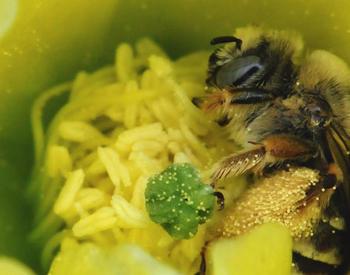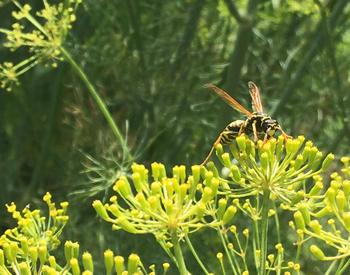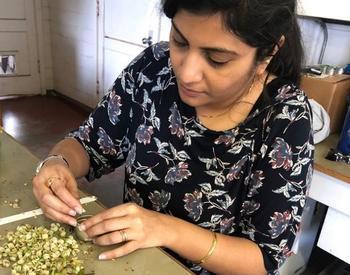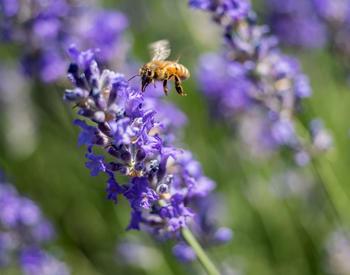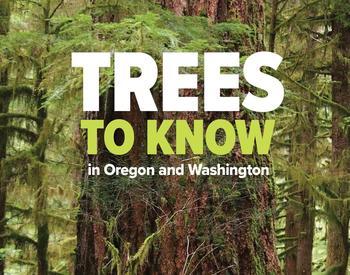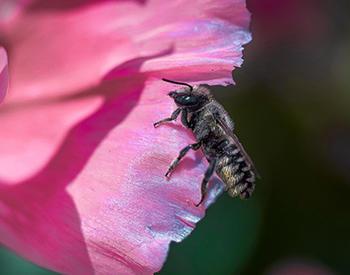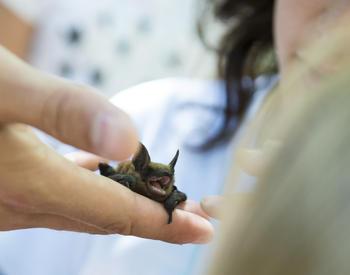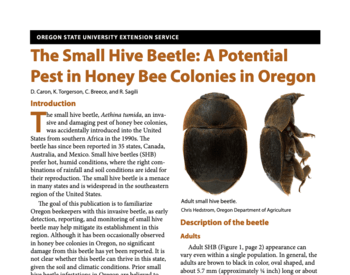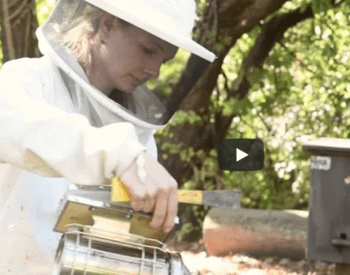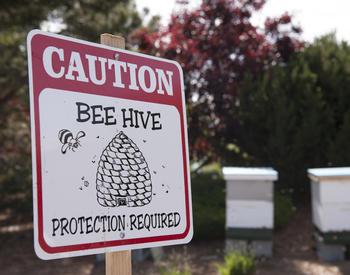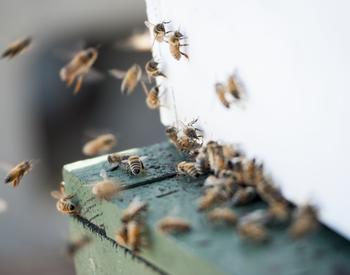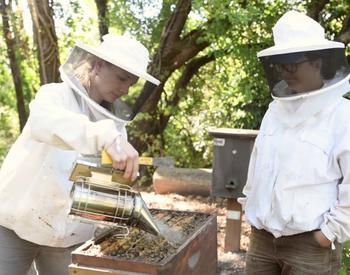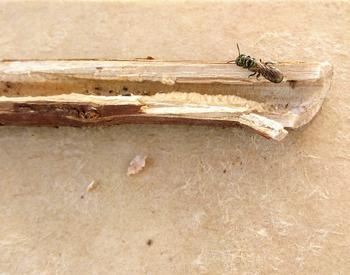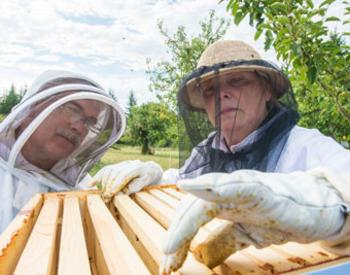Transcript
Speaker 1: From the Oregon State University Extension Service, this is Pollination, a podcast that tells the stories of researchers, land managers, and concerned citizens making bold strides to improve the health of pollinators. I'm your host, Dr. Adoni Melopoulos, assistant professor in pollinator health in the Department of Horticulture. There's been a spectacular rise in the interest of people who want to keep honeybees in cities.
No matter where you turn, you can go to the Paris Opera House and Chicago City Hall. There are honeybees in cities. The trouble is that laws and regulations around keeping bees in cities are often pretty heterogeneous.
They're different from place to place, even within a given state. And I thought this was a great opportunity to catch up with Mike Rodea from the Oregon State Beekeepers Association. He's the OSBA's agricultural liaison, and he interacts with governmental agencies at all levels to foster and advance beekeeping in Oregon. But Mike has a lot of experience dealing with the law of residential beekeeping.
In this episode, we're going to hear about House Bill 2653, which was introduced in 2015. It's an attempt to get around some of the problems with residential beekeeping and create some uniformity by providing some guidelines and educational resources for beekeepers in the state. I think this was one of the most innovative approaches to residential beekeeping anywhere in the U.S. So I'm hoping for Oregon beekeepers. This gives a little bit of a broader picture as to some of the changes taking place in the state to municipalities and counties.
A better picture of what this new House Bill entails, but also for people outside of Oregon, just a glimpse into some of the interesting things that are happening here. Hi, Mike. Welcome to pollination.
Well, thank you, Anthony. So if you're a beekeeper somewhere in the U.S., what kinds of things do you have to keep in mind when it comes to keeping bees in the city and the law?
Speaker 2: Well, it's a wide range of things, unfortunately. There is no consensus across the United States as to how bee shooters should be regulated. In some areas, there are no rules whatsoever. Within a city area, part of it could be an accounting part of being the city, and then one portion you could have bees and another portion you couldn't have bees. Some cities have flat-out bams, counties have bams. Some states, Georgia in particular, prohibit any local authority from adopting any bee rules whatsoever. But in most areas, it's just a hodgepodge with very restrictive rules, limiting the number of hives, limiting the number of locations, depending upon square footage or acreage, a limiting where you can have them within a city or not within a city. It's kind of a mess, and Oregon has been that way. And Oregon is not an exception to that, at least not up until recently. We were going through the same issues, in part because residential beekeeping, in a sense, really didn't exist 30 years ago or 40 years ago.
Whatever. And so it's a new endeavor, basically, of people living in the city. And so the cities have kind of had to address it as problems have come up.
And so each one will vary. It's time they might come up with it, or a county might come up with a problem. And so you end up with a wide range of things throughout the country.
Speaker 1: Well, I know you've dealt with the hodgepodge in Oregon. For many years now, you've been one of the key people in the state who people call on when they're dealing with their municipalities. Can you tell us some of your experiences here in Oregon?
Speaker 2: Yeah, I gave you how I started and gave you my background in enforcement activity. I worked for the state of Oregon for a while now. And as a beekeeper early on, we had an issue come up before the local beekeeping group. And they had been cited by the city for having bees in their backyard. They had two hives and a neighbor didn't like bees for some reason.
There wasn't anything about getting stung or anything like that. The neighbor just didn't like bees. So the city went and cited the beekeeper and said, you can't have bees.
We have a law prohibiting honey bees within the city. I was asked because of my background to kind of see what was going on. So I talked to the compliance people and they said, well, this is what the rule says.
You can't have any bees in the city. And I said, well, we don't think that's right. We think that's an overreaction to it. We don't even know why you have the rule, but what we can do. And they said, well, we can't do anything. You have to go to the city council and ask for a variance. And we said, what does that involve?
It's about $300 registration fee. Oh, okay. The beekeeper said I don't want to do that. So the beekeeper stopped keeping bees. So nothing happened for about two years. And then we got exactly the same complaint two years later. And so this is getting ridiculous.
Well, at least I thought it was. And so we said, let me take a look at this because I used to write rules and stuff for the state. And I looked at the code and I said, you guys are wrong. You're misinterpreting the code. It doesn't prohibit residential beekeeping or prohibit commercial beekeeping within the city. The compliance people said, no, we've interpreted this way. We've been doing it for 20 years this way. We're not going to change.
Speaker 1: But the intent was not to have an agricultural beekeeping operation in city limits, not a person with a few colonies.
Speaker 2: That's correct. And you will find as we have found that a particular way of looking at things exists in a lot of cities as they grow up. And from little birds and to become in a city, they believe cities do not allow farming operations in city limits. So they adopted limits on farming operations and bees, depending upon where you live, are classified as farm animals by the Department of Agriculture, for instance, in the state of Oregon. And so if you prohibit farm animals in the city, you also prohibit honeybees.
Speaker 1: Oh, man, I guess this really has not anticipated the explosion and growth in hobby beekeeping.
Speaker 2: No, not at all. Well, let me get back to the city of Salem. Luckily, one of the members knew a member of the city council. We went to lunch myself and the other member of the group and the city council said, you guys are absolutely right. You've interpreted this. We've been misinterpreting it for 20 years. So they revised the rule or their interpretation. It says you can have up to five hives in the city now without any restrictions. There's no law, no other rules except the five limit. And the limit of five is because they classify beyond five as commercial operations. So they handle difficulties if a problem arises with what's called nuisance rules. That is, rather than a specific rule if the inspector has to show there's a problem with the bees and then could site under a nuisance standard. And that's what we promote in Oregon. They have been promoting no specific rules.
Speaker 1: Okay. So what's a nuisance standard? What do you mean?
Speaker 2: Well, when I worked for the state, we used to have a rule. It was called the general duty clause. And what it says is even if there's no specific law or rule, if there is a problem that you can show as a problem that should have been dealt with, could have been dealt with, and is expected to be dealt with and somebody doesn't do that, then you can site under this general duty or nuisance rule and say, even though we don't have a specific rule, what you're doing is wrong and you've got to stop it. Okay.
Okay. So then you don't have to adopt a whole bunch of rules, but it puts a burden on the compliance person or inspector to make sure that they can prove there's an issue. Let me give you an example, which is kind of a thing that shows what this is. Let's say you have a rule that says you can only have three highs.
Okay. So what is the rule of three highs supposed to accomplish? What does it reduce or take control of? Well, an inspector can say, you've got four highs, I'm going to cite you. Okay. Under a nuisance rule, you would go in and say, you have four highs and one of them's causing a major problem with your neighbor or they all are, or whatever. And you need to think about reducing your high because that's a nuisance way of dealing with it. You show there's a problem and then you address it.
The other way is you simply count numbers, basically, and say you're either in or out of the numbers. Right. Right. Right. So it's a different way of looking at it.
Speaker 1: This time of year, we're recording this in August. And this time of year, I know I'm getting a lot of calls about wasps, but they're, you know, I had one the other day, somebody sent us a note and they said, I've got bees living in a hay bale.
And I said, can you get us a picture? And so I suppose the issue is here, you can have a situation where somebody's really doing a good job of managing their bees and somebody gets stung by a wasp and they go to the, you know, they say, Hey, these bees are a problem, but actually the nuisance is not, there's no nuisance. That's correct. All right. Okay.
Speaker 2: And I get a lot of those. Same thing. And people don't understand. Unfortunately, the way things are advertised for honey and honey products creates part of the problem. People see a yellow and black, whatever it is, and it's a bee. And they assume that that bee, which is not a bee, by the way, is a yellow jacket, which is a member of the wasp family.
I think that's correct. It's not a honeybee, but they think it is. And so they actually associate the problems they get with wasps and honeybees as the same thing. And unfortunately, the advertisements a lot of times for honey or cereal, whatever, show a yellow and black. Right.
Speaker 1: It's not the color of a honeybee. Right.
Speaker 2: All right. Let me give you another experience we've had with the municipality. Okay. And this one really went on for like over three months. We went to city council meetings. I presented arguments and counter-arguments. I even prepared a DVD showing beekeeping and what's good about it. And what we had was a member of the city, actually, the secretary who works for the city council, who was allergic to bees and for some reason, decided that Africanized killer bees and European honeybees that we keep were the same thing. And she was adamant about not having bees within the city. So she proposed a set of rules to the city that basically banned bees or put so much regulation on them.
That would be inconceivable really to try and keep bees. Okay. It turned out that this went on for a number of months until this. And this is going to show you how sometimes taking care of a problem is not always straightforward. I began to see that whenever I submitted information for the next council meeting, this particular person was well prepared to counter any kind of thing I would say before I ever even presented it.
I eventually found out she was receiving all of our correspondence before it was presented to the city council and then preparing her arguments ahead of time. So what I did is I went to one of the officials and said, I don't think this is fair that your particular person's doing this. And the official said, but that's the way it is. And I said I don't think it's right.
He said the same thing. But interestingly enough, a week later, they dropped all proposals for beekeeping restrictions in that city. And they now allow beekeeping without any restrictions. And they haven't had any issues. And that's the issue we point out to them, is that rules do not make or break problems with beekeeping. They don't really help anything. They just don't accomplish anything.
Speaker 1: I suppose once you start the rule-making process, you can get caught in the weeds. You start to dream up a million scenarios.
Speaker 2: Yes. And the cities and counties, because we do have counties doing that, is in their support. They are approached by people who are concerned because they're allergic or they think they're allergic and that they're going to get stung and they're going to die or they're going to in the hospital. And they said to the city, can you do something about this?
Can you regulate bees so that we don't have a problem? So the city, in most cases not knowing what they do, sort of looks around, finds something that looks like maybe somebody else has used it and they adopt it. And most of them have really very little understanding of the problem. And many of them just inherited whatever they've got on the books in the first place. And most of those people are reasonable if you get to talk to them. I know I'm going on and on.
Speaker 1: No, no, no. So I think that's sort of the experiences you've had in Oregon in some cases. It's a matter of there's a statute on the books that doesn't really apply anymore or one person is sort of really trying to tilt the process. It seems like dialogue is really important, really providing education to municipal lawmakers so that they have a sense of what this issue is. Okay.
Speaker 2: One other experience is an example of where we ended up not, I've done about a dozen of these, a little bit more, maybe 13, 14. And in almost every case where we've had to interface with the cities and others, we've come out ahead, ahead in the sense that they have backed off a dock and regulations altogether, or they have modified what they've done to allow beekeeping with a minimum of regulation. But I'll tell you an example of how one of these sorts of came out of the city north of Salem here, that a beekeeper decided to put Mooges bees from his backyard over into his mother's yard, which actually spaces on the street and then it was a kind of a vacant yard. And somebody walked by and saw this hive sitting there about 25 feet from the sidewalk. They complained and the city came out and sided with them, the sheriff, the city police officer, the captain, and whatever it was, said, we don't allow bees and they sided a stand of rule that said they don't allow exotic species in the city. And we said, what?
What do you mean exotic? Well, they had classified someplace along the line about 20 years ago, maybe about the time Africanized bees became kind of well-known to everybody, that honeybees were exotic animals and could not be kept in the city. Well, we went to the city council and they were very friendly, by the way, the city council was and they were very honest, particularly the mayor, who said in essence, I have to do something because I have a brother who has a son who's allergic to honeybees and my brother has asked me to do something to control honeybee so that his son's not afraid of going outside.
So we work with them, I'm not kidding you, this is true. We worked with them over several months and they finally adopted a few rules, which we don't like any rules, like told you, like nuisance standards, but they allow three hives and up to five during the time they might make splits or you might have a collective swarm. But then at the beginning of the next year, you drop the three hives, and other than that, that's their only restriction and that was done as the mayor admitted, well, I had to do something to keep my brother happy. That's the essence of it.
So you get into these interesting kinds of situations, at least they don't ban bees and the beekeeper didn't intend to have more than three hives and he's the only one in the city by the way, at least at the time.
Speaker 1: Okay, so let's take a break right now. What I want to do is I want to come back and talk about how things changed in Oregon after 2015. Okay, well, welcome back. We were talking in the first part about some of your experience, Mike, dealing with municipalities and counties, and in 2015, Oregon passed a host bill 2653. Can you tell us how that fits into residential beekeeping?
Speaker 2: Yeah, well, for several years before that particular legislation, I had suggested to the Oregon State Beekeepers Association that this business is going from municipality to fight in these battles one by one by one.
It's kind of, it just doesn't make sense. Why don't we propose a set of guidelines or a set of rules for the whole state of Oregon and see if we can get the legislature involved in it? Well, I was shot down immediately. Well, you know, the Oregon legislature is kind of cynical. You don't never if you go in there, you don't know what you're going to come out with.
You might come out with a ban. So we didn't do anything. We have this lady who lived in Portland, her name is Rainie Ritalto, and she moved two miles east toward the city of Gresham. At keeping bees, she had three hives, I think, two or three hives. In the city of Portland, they had rules that allowed honeybees, registered, and stuff, but they allowed honeybees. Well, she moved and she had a Portland address two miles east, and somebody complained that she had honeybees and the city aggression came out and cited her for housing honeybees in the city aggression. But she says, I have a Portland phone number and they said, doesn't make any difference here in the city aggression. We don't allow bees. She said this is crazy. I only moved two miles away.
I haven't changed anything other than where I'm at. So she went to her legislature, and legislature tour and proposed that they adopt some kind of bill regulating honeybees. And the legislature didn't know, the legislature tour didn't know much about it. Now, Rainie was working with the city aggression to revise their regulations to allow honeybees. But they set up a committee in 2015 to look at this legislation that had been suggested, at least some kind of legislation by Rainie. And I and the department of Ag and OSU was involved and members of the League of Oregon Cities and Oregon counties were there. And we sat down and said, can we come up with a bill regulating honeybees and my initial proposal, let's do what Georgia did, prohibit all the locals from adopting any rules.
Well, the cities and the county said, we're not going to agree to that. So what came up with was House Bill 2653, which is basically a compromise bill. It is primarily an education bill in that OSU is to develop guidelines for beekeeping. Beekeepers are to basically be trained in and hopefully follow all of those guidelines. The city and counties could look at whatever rules they had or didn't have and in line with the guidelines, hopefully maybe change to come in line if they had rules with what the guidelines were proposing. So that's the kind of essence of the bill. We had to go to OSU and the counties and OSBA to try and implement these guidelines and minimize regulations throughout the state. And so that's pretty much what that bill was all about.
Okay. And I, so it's what its idea was is trying to come up with some kind of way that if you could move from Salem to Albany or McMillan, you weren't going to be facing a whole different set of regulations or requirements or restrictions.
Speaker 1: Well, and I remember that was the whole sitting down with you because when I first got here and you read the preamble, you said, Oh, the preamble of a bill is really important. And in the preamble, it really says two things. It says, you know, beekeepers need education.
And the public also needs to know that there is a role for education and being able to rather than just jumping to rules, there is a real important part of education in this whole process. Yes.
Speaker 2: Yes. Yes, yes. And I'm glad you mentioned that because it turns out that if you look at the law and it's sterile, just without the preamble, you might get a different impression. And it's unfortunate that the preambles with some of these regulations because that's part of the intent is to what it's all about. It's not simply passing a law that says somebody does something or doesn't do something. There's a reason behind that particular set of wording. So, and that's what House Bill 2053, and we, you know, it is frustrating.
Now I'll tell you why. Because you have cities and counties that said, we wanna know specifically what we have to do. We want a set of rules.
And House Bill 2053 is not a set of rules. It's essentially a program for educating beekeepers, the public, and the cities and counties about PGP. That's essentially what it's all about. It doesn't have enforcement powers with respect to whether or not you do or do not follow the guidelines. It doesn't have enforcement powers for penalizing the city that they do or don't do something. It's not that kind of bill, but there is a misunderstanding by some people about what that bill is all about.
Speaker 1: Right, and the only recommendation that it makes in the bill when it comes to the law is nuisances. It says to really kind of encourage, it seems like encourage an approach that involves both existing nuisance regulations and education together.
Speaker 2: Yeah, and that's a good point. You pointed that out because that was basically part of our insistence. If you won't prohibit cities from adopting rules, can we at least provide guidelines in there that use nuisance rules and regulations to regulate beekeeping?
Because we know of no set of guidelines, no model rules, any place that's based upon any scientific study that we know of that can fairly address beekeeping. It varies. It varies on location. It varies on the bees that you may not have.
It varies on your neighbors. And so you can't deal with it with a set of rigid, firm set of limitations. And that's what that is. That's part of their agreement that the cities gave us is that in the counties they would follow nuisance, but they're not required to, but they're encouraged to.
Speaker 1: Okay, so let's come to the educational part of the bill. You were involved in the development of the guidelines that were outlined in the bill. Can you tell us how these guidelines came about? How are they developed?
Speaker 2: Well, that was actually, it never does say in the law exactly how it says that OSU, beekeepers, Department of Ag, and then it sort of implies others would get together to help develop these guidelines, which is exactly what we did. We put a committee together. Anthony, you were the chairperson of that committee.
I ended up probably suggesting a lot of the people that Rainey Ritalto was involved in, for instance. I as a representative of the OSBA and a couple of others, including the president of, the OSBA and the Department of Ag were there. Gosh, I can't remember.
We had like 10, 12 members at one time. And we sat down and as beekeepers, we said, what would we recommend to beekeepers that they should follow to reduce problems with their neighbors? How can we practice nuisance-free beekeeping? And I think you coined that word originally, as nuisance-free beekeeping.
Yeah, that was me. So it would not be a problem, if we didn't have a problem with neighbors, and maybe the cities wouldn't feel obligated to ban honey bees and become really hard-nosed about it. And so we sat down and we had quite a large document to begin with. You've outlined, we did an outline of all the various areas that we thought we should address. And then we filled into those areas and different people contributed different portions of it, we added it, edited it and added it and deleted it until we got to where we felt that everybody was pretty much in agreement, that this was reasonable stuff for beekeepers to do. And then it was peer-reviewed.
And then some more changes were made. And that's the guidelines that we have. And we think they're called best practices because that's what they are. There are things that are good to be followed, whether or not you're thinking about regulations or not, they're just good beekeeping practices.
Speaker 1: Right, those are for the people who don't know, I'll link it to the show notes. Those are the pages associated with this podcast. These were published earlier in the year and there's Master Beekeepers are training, are gonna be rolling up training this fall for beekeeping clubs on how to follow these guidelines.
Speaker 2: Yeah, let me give you something out of that guidelines that sort of make how people understand. The guidelines do not contain any limits on the number of hives that you have. I mean, ostensibly you could put two dozen hives in your yard unless there's a local city restriction on it. But it does talk about the fact that you need to keep track of what your bees are doing.
You need to understand its interaction with your neighbors. And if for some reason your hives, for your locale are really causing problems, then you have too many hives. If you don't have to limit it by a number of hives, you limit the hives based on whether or not you have issues and you as a beekeeper need to keep track of those issues. You need to be talking to your neighbors. You need to be watching your bees. It's not just about beekeeping anymore. It's about beekeeping. It's changed. We just learned how to be a basic beekeeper. Yes, now you learn how to be a basic beekeeper plus how to be a beekeeper that's not gonna cause problems with your neighbor and your community and your city.
Speaker 1: That's a really good point. It seems like in drafting the guidelines, we really wanted people to exercise judgment. We wanted them to be able to judge a situation and adjust as things go. Yes, yes, yes. If I remember in the guidelines, it starts with two and then you can add more if you feel comfortable if you think you've got the situation under control then. That's correct. Right.
Speaker 2: Yeah, let me give you an example of exactly what has happened. And I can name the city. It's the city of Monmouth. We got a call, gosh, about two months ago, now three months ago from the city basically saying, we don't know what to do. We don't have any rules. But we have a complaint over here about bees and this guy is backyard invading the neighbor's backyard. And we're thinking of adopting some rules.
Well, our intent immediately lights up because we don't want them to adopt rules. So I went out and I met with the city and members of the council people and the compliance people, the beekeeper, and the neighbor. The fella had five hives. His five hives were about 20 feet or so, really small backyards by the way. The backyards had butted up against one another and she had extensive in the fall zinnias. And the bees apparently like these zinnias and she didn't like honeybees. She didn't like being stung. And when she was in there trying to manicure her zinnias, she got stung and she said, I don't think this is right. So I went over and I made some suggestions to the beekeeper and the neighbor about how they could get along or whatever. One of the suggestions was you might want to reduce the number of hives that you have and see if that takes care of the problem. And then let's see what happens this fall. Well, he agreed ultimately to reduce the three hives and the city said, okay, we're happy. The neighbor said she was happy and the beekeeper said, I'm not entirely happy, but I'm gonna reduce the three.
Speaker 1: Right, right, right. No, that's a good example. And I think that that was one of the things in the guidelines is that if there is an issue like this get the state beekeepers association involved to do just what you did to assess the situation, help the code enforcement officers sort of figure out the mitigation.
Speaker 2: Yeah, yeah. Right, and I don't know if you know that. Well, you know it, we've set up in each region, or almost every region, a separate person called the residential beekeeping consultant. And they're the first line of issues that come up to deal with beekeeping issues at the local level. And then if they can't, they bump up to the Oregon State Beekeepers Association and we would get involved.
For now, primarily myself. But the idea was to try and deal with it as close to the local as possible and resolve it there before you have to get involved for the rest of the line.
Speaker 1: Now, one of the things that's in the guidelines as well is that municipalities or counties need to look over their existing rules before January 1st of this year. And if we have some listeners who are from, who are working for municipalities or counties, what should their next steps be? How do they kind of meet this deadline? What should they be doing?
Speaker 2: Well, you know, my idea is that they look at it with respect to the guidelines, whatever rules they have, and see if they really need those particular rules that they have. And if they decide they do, they can. But we would hope that because nuisance beekeeping can be regulated with nuisance rules, that you don't need a lot of specific rules. And we would hope they would adjust their rules in accordance with what the guidelines are all about. But they're not required to.
Now, there is one issue that comes up. They're not required to adopt any rules relating to beekeeping. However, this is something I'm sure they're aware of if they're from Oregon.
The League of Oregon Cities has put together a model beekeeping set of rules. And they have distributed to their cities and the state. And because some cities said we want a model code to go by, it has to be understood they're not required to adopt any code, let alone a model code, any city, that's not required.
And we hope they don't. We will say, however, that the model code that the cities came up with isn't one of the worst things we've ever seen. It's not anything you prefer, but it does reflect somewhat the guidelines and it does refer to the guidelines and it does refer to working with beekeepers if issues come up. So in that respect, it's not a bad model. But again, we don't think model rules are ever necessary. But still, the city, by the end of the year, a county has to look at its rules. They have to, by the law. I'm not saying there's any enforcement from, I'm not who should enforce them, but by law, they are required to review their rules by the end of the year, by January 1st, and make adjustments.
Speaker 1: Okay, and now let's say you're a beekeeper. Let's say you're a beekeeper and you get cited. What should you do? What's your next step? I mean, people will probably get really nervous at that point, not sure exactly what to do. What advice do you have for beekeepers if they get cited?
Speaker 2: Well, okay, let me kind of give some, first of all, it's not a criminal thing. You're not gonna get thrown in jail, at least not in most areas. Most of this is called civil penalties, which means usually it's a fine or some kind of threat of removal of the bees or something. So you can contest it. You can say, I don't think this is right. Be a guise, however, you better be on firm ground. You don't just contest it, you don't like it. You can test it because it is incorrect or unfair.
Or if it is one of these things where there's a limit, which is really not necessary, you really, in most cases can't deal with that yourself. You just don't have the experience. You're better off working with the local consultant or with myself, who's then worked with municipalities to see if we can't help resolve the issue.
Get it with Ron. I give you one, we had a county issue just recently come up with cited, he was ordered to get rid of his bees. I interviewed, well, I was requested to interview. And we got it put on hold, that the citation is not gonna be enforced.
Wow, and this is a county considering revising its rules to allow BTP. So now we did resolve the issue in that he had to provide some water and stuff like that. But it was something that he really couldn't deal with on his own. And one of the important things is don't take these people head on, don't fight with them. Don't try and run over the top of them.
You're gonna lose if you try to do that. And don't get the press involved. Don't get all your neighbors involved, right into the city or whatever. You're not gonna win if you do that. Okay. You gotta handle it without emotion. Okay.
Speaker 1: Okay, okay. And I imagine you're really distraught. You're thinking about your beekeeping operation and suddenly you're confronted with this. But your advice is really kind of think carefully about it. Reach out to, if you're in Oregon, your regional person who deals with this and kind of works constructively with the municipality.
Speaker 2: Yes, yes. And most of them will adjust. I mean, my experience has been we've only had, we've never had a loss. We've had adjustments with some of these people because almost every one of these governmental agencies other than some of the enforcement agencies is fairly reasonable, okay? And if you give them a chance, they will work with you. But you've gotta give them a chance.
Speaker 1: Okay, fantastic. Well, let's take a quick break. I've got a couple of questions we ask all our guests these questions. I'm curious what your answers are gonna be. So back in a second. Okay. Okay. All right, well, welcome back. Mike, I'm really curious. Do you have a favorite book about pollination?
Speaker 2: Pollinators. Yeah, I do, but it's a reference book. It's called A Hive and the Honey Bee. Oh, great. And the reason I like it, yeah. Because it's very, very thorough.
It's not always up to date now with some of the stuff with Ro in particular, but as a reference manual, I really like it because I can go in there and find a lot of different ways and different answers to questions that other books are sort of training books and they're fine. But I'm kind of beyond that. I'm on a reference book now. So that's what I use.
Speaker 1: Do you have an addition that you, I remember the addition that I still carry is the one from the 90s, the brown covered one.
Speaker 2: That's what I have, ready brown, yeah. That's because I bought it back in the early 2000s or something like the late 90s.
Speaker 1: Yeah, that's what I got. I find it really cool that it's, every generation of experts writes, it makes a contribution, and different versions of it have real different chapters. It's really great book.
Speaker 2: Yes, yes. It's like a Bible of beekeeping, and I like that. It's the size of a Bible. Yes.
Speaker 1: Okay, my next question is, do you have a favorite tool for working with pollinators?
Speaker 2: Well, it's funny. I don't really have a tool with pollinators, but I was thinking about that the other day, what I like to do is partly because of what my background is, is I like to work with trying to solve these legal issues with the cities and between people. And to do that, what I found is two things, if you want to call them tools. And that is, and I'm hoping I can get away with this, and if I can't, you'll bleep me out. And then you bombard them with bullshit.
It's not quite that way. What can do is I really found that if I present a lot of very documented information about beekeeping and how beekeepers are beneficial to everybody, including their backyards, and that bees are not all nasty, that you don't, everybody is not allergic to honeybees. For instance, more people die by falling downstairs than they die by being stung by honeybees, so why don't we buy them the stairs, okay?
If you're going to ban something. I find that that and persistence don't give up, keep going back, it might take you a while, in this case, we've been 20 years at this, but I think ultimately we win, because what we do is beneficial, and we just need to let everybody understand that that's what it is. So to me, it's having lots and lots of information and keeping at it until you win.
Speaker 1: Yeah, I've noticed that about you as well. We've worked together for a couple of years now, and really lining up your facts, and just being straightforward, clear, and just focused. You're very focused when you're dealing with these issues. I've seen you sort of try to figure out what the problem is. You keep asking, you ask a lot of questions, and then you kind of zero in, is this the issue? Okay, that's solvable.
Speaker 2: Yeah, and the other thing is a lot is involved in the way people word things, or think they interpret things. And sometimes it's just misunderstandings a lot of times about things. So yeah, and I don't know, I kind of focus on that kind of stuff. So, okay.
Speaker 1: All right, well, the last question is, and this is really unfortunate for a honeybee person, because the question is, do you have a favorite pollinator? And it may be honeybee, lots of people who keep bees, but do you have a favorite pollinator? Or is there a specific honeybee?
Speaker 2: Well, again, that's a difficult question. I mean, obviously honeybees, but let me be more specific than that. I mean, honeybee because that's what I deal with. And so, to me, they're my favorite pollinator. But I had a colony that I picked up as a swarm about 15 years ago, and they were absolutely gold in color. The whole body was gold. And they were the most gentle honeybees I had ever had.
I mean, they didn't bat an eye. You could go in there, you could pull frames, and it was a wonderful experience. But I was, you know, I've only been in the business for about 20-some years now, as a beekeeper. And I was relatively new 15 years ago, and somebody said, well, it's a swarm, right? And I said, yeah, well, you need to reclaim it, because you don't know the quality of the queen. Oh no. Well, I really cleaned it.
Yeah, you know exactly what happened. Oh no. I really cleaned it. I didn't have golden honeybees anymore.
That was the best hive I ever had. Oh, man. I've never seen them since. Never seen them since. All right. When I caught a swarm again, that was absolutely golden like that, or ever had any honeybees as gentle as those particular golden honeybees were.
Speaker 1: All right, queen breeders who listen to this show, if you want to make Mike's day, put an anonymous Cordova queen in his mailbox, you'll be forever grateful.
Speaker 2: Absolutely. Don't cover everything.
Speaker 1: Well, thanks for taking the time to talk with us. I think this is a timely issue, and I know lots of people outside of Oregon are really curious about how things have been managed here in Oregon, so this is a great resource for them.
Speaker 2: Well, let me ask you something, Anthony, if we're still on there if people want to contact me, I feel free to have them contact me, by email or by phone. Understand if they phone, I have an answering machine, and I let it screen every call. So if they want to talk to me, they better doggone, well, tell me what it's about, because the only way they're gonna come through is after going through the answering machine. If they want to email me, I'd be fine. That'd be also fine.
Speaker 1: Okay, well, thanks, Mike. That's really generous. We're gonna link Mike's email address on the show notes. So if you're in another state and you wanna pick Mike's brain, this is a great opportunity. Thank you so much, Mike. All right, well, thank you, Anthony.
Thanks so much for listening. Show notes with information discussed in each episode can be found at pollinationpodcast.oregonstate.edu. We'd also love to hear from you and there are several ways to connect. For one, you can visit our website to post an episode-specific comment, suggest a future guest or topic, or ask a question that could be featured in a future episode. You can also email us at [email protected]. Finally, you can tweet questions or comments or join our Facebook or Instagram communities. Just look us up at OSU Pollinator Health. If you like the show, consider letting iTunes know by leaving us a review or rating.
It makes us more visible, which helps others discover pollination. See you next week.
Ralph (Mike) Rodia, a life time member of the Oregon State Beekeepers Association (OSBA) and the Willamette Valley Beekeepers Association [WVBA], has a PhD in Organic Chemistry, was a research scientist, college educator, occupational health inspector and supervisor (Oregon OSHA), Oregon Chief Deputy State Fire Marshal, and has been active in the OSBA at the regional and state levels for the last 20 years. His experience in the preparation and implementation of laws and rules has allowed him in the past, and now as OSBA’s Agricultural Liaison to interact with governmental agencies at all levels, to foster and advance beekeeping in Oregon, particularly as it relates to residential beekeeping.
Listen in as we talk with Mike Rodia about residential beekeeping and the ways to work with your local government to keep your local hives nuisance-free.
You can Subscribe and Listen to PolliNation on Apple Podcasts.
And be sure to leave us a Rating and Review!
“Residential beekeeping didn’t really exist 30 or 40 years ago, so the cities have had to address it as problems have come up, so each [city] will vary each time it comes up with a problem.” – Mike Rodia
Show Notes:
- What residential beekeepers need to know about their local laws
- How Mike got started with beekeeping
- What a nuisance standard is, and how it can be used to help
- Why the public misunderstanding of bees versus hornets or yellow jackets can cause such huge issues for residential beekeepers
- What Mike has experienced with unnecessary rules and regulations on residential beekeeping in municipalities and counties
- How Mike circumvented regulations in an Oregon house bill with education instead
- How the committee behind the bill developed the education guidelines
- What Mike recommends for municipalities looking to manage their residential beekeeping issues
- Mike’s advice for residential beekeepers that get cited
“Rules do not make or break problems with beekeeping. They don’t really help anything, they don’t accomplish anything.” – Mike Rodia
Links Mentioned:
- Find out more at the Oregon Residential Beekeeping Website
- Check out Mike’s favorite book on pollinators: Hive and the Honey Bee
- Learn more about Mike’s favorite bees
- Connect with Mike Rodia through email
